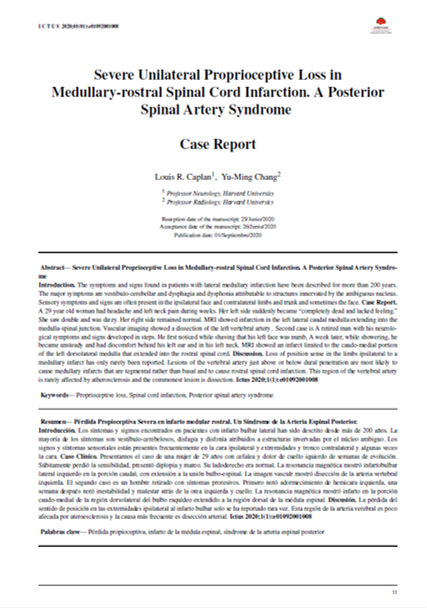Abstract
Introduction. The symptoms and signs found in patients with lateral medullary infarction have been described for more than 200 years. The major symptoms are vestibulo-cerebellar and dysphagia and dysphonia attributable to structures innervated by the ambiguous nucleus. Sensory symptoms and signs are often present in the ipsilateral face and contralateral limbs and trunk and sometimes the face. Case Report. A 29 year old woman had headache and left neck pain during weeks. Her left side suddenly became “completely dead and lacked feeling.†She saw double and was dizzy. Her right side remained normal. MRI showed infarction in the left lateral caudal medulla extending into the medulla-spinal junction. Vascular imaging showed a dissection of the left vertebral artery . Second case is A retired man with his neurological symptoms and signs developed in steps. He first noticed while shaving that his left face was numb, A week later, while showering, he became unsteady and had discomfort behind his left ear and in his left neck. MRI showed an infarct limited to the caudo-medial portion of the left dorsolateral medulla that extended into the rostral spinal cord. Discussion. Loss of position sense in the limbs ipsilateral to a medullary infarct has only rarely been reported. Lesions of the vertebral artery just above or below dural penetration are most likely to cause medullary infarcts that are tegmental rather than basal and to cause rostral spinal cord infarction. This region of the vertebral artery is rarely affected by atherosclerosis and the commonest lesion is dissection.
References
Marcet A. History of a singular nervous or paralytic affection attended with anomalous morbid sensations. Medico-chir Trans 1811;2:215–233.
Wallenberg A. Acute bulbar affection (Embolie der art. cerebellar post. inf.sinistr.?). Arch Psychiatr Nervenkr 1895;27:504–540.
Wallenberg A. Verschluss der arteria cerebelli inferior posterior dextra (mit sektionbefund). Dtsch Z Nervenheilkd 1922;73:189–212.
Caplan LR. Vertebrobasilar Ischemia and Hemorrhage: Clinical Findings, Diagnosis, and Management of Posterior Circulation Disease, Cambridge UK, Cambridge University Press, 2014.
Kim JS. Pure lateral medullary infarction: clinical–radiological correlation of 130 acute, consecutive patients. Brain 2003;126:1864-1872.
Kim JS. Sensory symptoms in ipsilateral limbs/body due to lateral medullary infarction. Neurology 2001;57:1230-1234.
Chen F, Liu X, Qiu T et al. Cervical posterior spinal artery syndrome caused by spontaneous vertebral artery dissection: Two case reports and literature review. J Stroke Cerebrovasc Dis 2020;29:1-6.
Campero A, Rubino PA, Rhoton AL Jr. Anatomy of the vertebral artery. In Pathology and Surgery around the vertebral artery George B, Bruneau M, Spetzler RF (Eds), Paris, Springer, 2011 pp 29-40.
Duvernoy HM. Human Brain Stem Vessels, Berlin, Springer-Verlag, 1999.

This work is licensed under a Creative Commons Attribution 4.0 International License.

